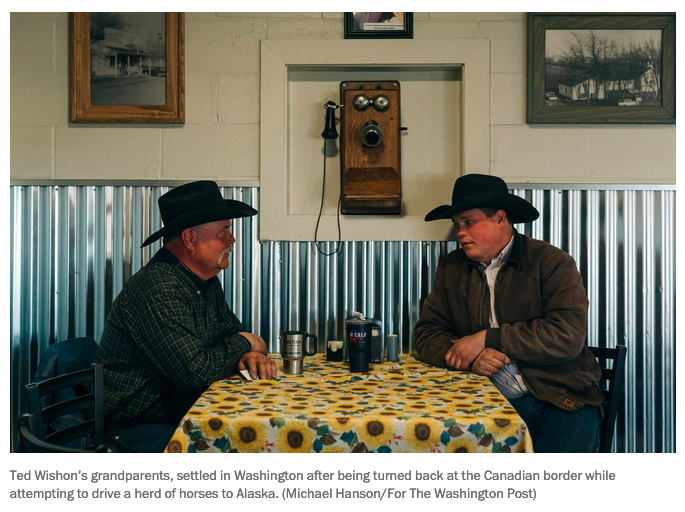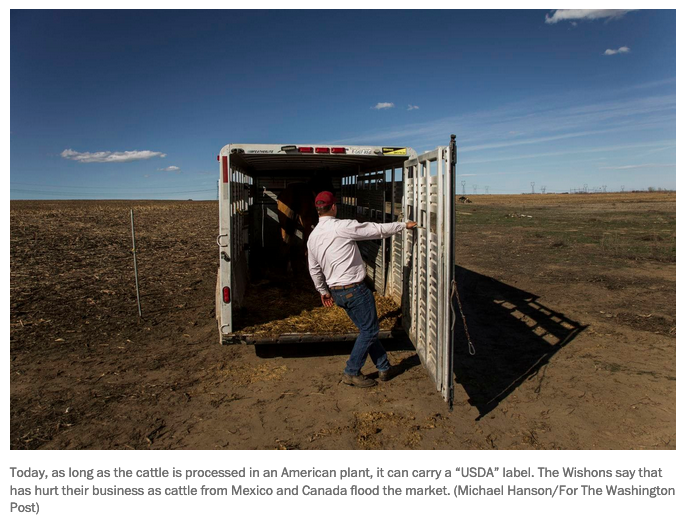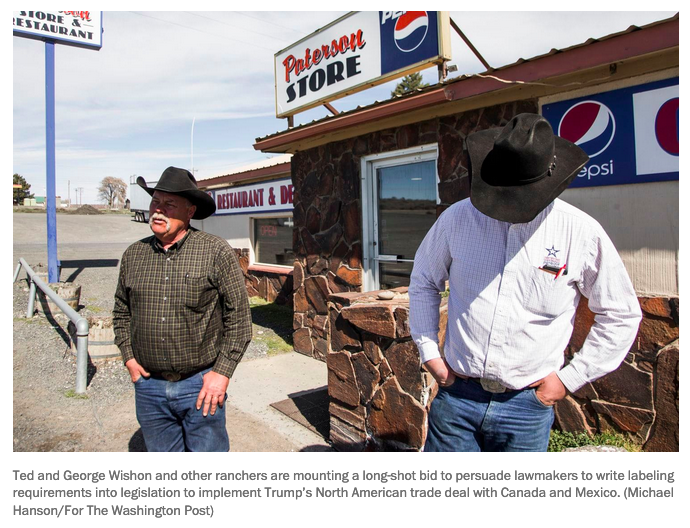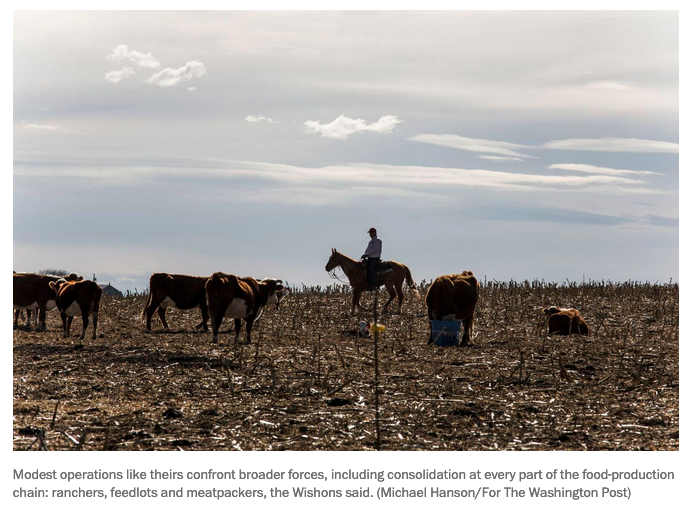Washington Post: ‘America First’ may be last hope for these cattle ranchers
by David Lynch | May 3, 2019
PATERSON, Wash. —Fifty-mile-per-hour winds and snow drifts seven feet deep greeted Ted Wishon when he checked on his cattle herd, hunkered down on a hillside along the northern bank of the Columbia River.
With his 21-year-old son, George, Wishon labored through six weeks of brutal weather this year keeping hundreds of animals alive. The two men — living in a spartan trailer on leased land pinned between a winery and the icy waterway — repaired fences, delivered calves and kept the herd fed and watered.
As spring approached, the snow melted and the winds grew slack. The gales that now buffet the Wishons are political.
The men are among a group of cattle ranchers who say their livelihood may depend upon persuading Congress to order mandatory country-of-origin labeling for the steaks and burgers they produce. The government once required such labels, but lawmakers outlawed them in 2015 to comply with global trade rules.
The election of Donald Trump, a vocal advocate of “Buy America” policies who revels in disrupting the status quo, gave the ranchers hope of reversing their earlier defeats. But they are finding that even in an “America First” era, the laws of politics still apply: An industry needs powerful legislative allies, a united front and a credible path to victory.
The ranchers now are mounting a long-shot bid to persuade lawmakers to write labeling requirements into legislation to implement Trump’s North American trade deal with Canada and Mexico. Without them, the deal will favor the multinational corporations that dominate the meatpacking industry at the expense of American cattle ranches, said the Ranchers-Cattlemen Action Legal Fund (R-CALF), a trade group.
“We have a superior product, but the consumer doesn’t know,” said the youngerWishon. “What might be good for American cattle producers in a trade deal might be squashed by the multinationals.”
Over the past decade, labeling advocates — who insist consumers prefer meat identified as American — have won and lost congressional battles, been rejected twice by World Trade Organization (WTO) rulings and battled members of their own industry who call the measure costly and unnecessary.
The Wishons say made-in-America labeling could determine their survival as independent producers. The family’s operation was solidly profitable four years ago but now exists on a thin financial margin the men blame on powerful foreign forces.
“We struggle to make ends meet,” said Ted, 58, who has the ruddy complexion and meaty hands of a man accustomed to working outdoors.
The family’s first ranchers, Ted’s grandparents, settled in Washington after being turned back at the Canadian border while attempting to drive a herd of horses to Alaska.
His father later opted to run a sawmill rather than a ranch. So when Ted and his wife, Debbie, launched their operation in 1985, they had only 10 head of cattle.
“We started from scratch,” he said. “We didn’t inherit anything.”
Today, they own about 750 Hereford cattle, which spend winter months in Paterson and the rest of the year near Colville, north of Spokane. It would take three tons of hay per head of cattle to keep the herd alive up north during the winter, which is why Ted and George bring them here to graze on corn stalks and wheat.
On a recent day, father and son drove across the pasture in their 2006 Dodge Ram pickup with 300,000 miles on it. Shotgun shells rattled on the dashboard, available if needed to deal with the coyotes that threaten the herd.
As cattle prices rose and fell in recent years, the Wishons became convinced they were the victims of foreign forces, including the WTO and large meatpackers.
From $79 per 100 pounds in December 2009, prices soared to a peak of $171 in November 2014, before plunging to $94 in late 2016 and recovering now to about $115.
Bill Bullard, chief executive of the 5,000-member R-CALF, said mandatory product labeling would allow domestic cattle to command higher prices.
The larger National Cattlemen’s Beef Association (NCBA), representing about 175,000 cattle producers, feeders and meatpackers, insists that’s not true.
The association, which backs voluntary labels, cites a 2015 study for the U.S. Agriculture Department, which “found little evidence that consumers would be likely to increase their purchases of food items bearing U.S.-origin labels.”
The controversy dates to 2008, when Congress required mandatory labels for beef and pork. But when the labeling rules were in effect, only animals that were born, raised and slaughtered in the United States qualified as “Product of USA.”
Major meatpackers objected to the added cost of tracking and separating live animals, an expense that was passed along to some ranchers.
Kevin Kester, a rancher in San Luis Obispo, Calif., whose herd includes cattle from Mexico, said the measure had added a six-figure sum to his annual costs.
“We had to quit producing the Mexican cattle. It had a huge negative impact on my family ranching business,” said Kester, a former NCBA president.
Mexico and Canada, which ship about 2 million live cattle each year to the United States, complained to the WTO that the measure was an impermissible trade barrier.
In 2012, the organization agreed. The Barack Obama administration rewrote the regulation, but two years later the global trading body vetoed that approach and authorized Mexico and Canada to levy $1 billion in retaliatory tariffs on U.S. agricultural exports if the labeling requirement was not dropped.
Congress swiftly repealed the measure.
Today, as long as the cattle is processed in an American plant, it can carry a “USDA” label.
Bullard said that a plunge in cattle prices that occurred around the same time demonstrates that the end of labeling hurt ranchers. But live cattle futures began falling almost a year before the final WTO ruling, and a 2018 study by the Government Accountability Office concluded prices collapsed because of basic supply-and-demand factors, including a prolonged drought that affected the price of cattle feed.
Trump’s first months in office encouraged Bullard to renew the fight. In his first 90 days in the White House, the president issued a “Buy America” executive order governing federal contracting and included “country of origin labeling” on a 24-point list of his trade-negotiating goals.
“We were elated when the new president announced the executive order,” Bullard said.
But opposition from powerful lawmakers quickly scuppered their prospects. In a March 2017 hearing, Sen. Pat Roberts (R-Kan.), chairman of the Senate Agriculture Committee, warned Robert E. Lighthizer, the president’s chief trade negotiator: “We do not need to go down that road again.”
Lighthizer’s office declined to comment.
Bullard said he recently made his case to administration officials, including Peter Navarro, an assistant to the president. But there is little appetite in the nation’s capital for re-litigating the trade spat at the World Trade Organization, and R-CALF is outgunned by the more powerful NCBA, which worked to repeal labeling and prevent the Trump administration from bringing it back, according to its lobbying disclosure forms.
Since 2012, the group’s political action committee (PAC) has sharply increased its campaign spending, contributing $3.1 million to candidates for federal office, with nearly all of it going to Republicans.
Bullard’s group spends $200,000 on annual lobbying expenses, but lacks a PAC.
The younger Wishon holds out hope that Trump will come to the ranchers’ rescue.
“I’m a little bit shocked he hasn’t gone the American beef route the way he has with other commodities,” he said. “But he isn’t done yet.”
Because labeling was not part of the negotiations with Mexico and Canada in the North American trade deal, it probably cannot be included in the legislation. Congress can add to that bill “only such provisions as are strictly necessary or appropriate,” according to a 2015 trade law.
“This is a big challenge,” said Roger Johnson, head of the National Farmers Union, which supports mandatory labeling. “We have been up on the Hill and having not a very good reception.”
Labor unions backing efforts to tighten enforcement of the trade deal’s labor provisions are having more success. They enjoy support from House Speaker Nancy Pelosi (D-Calif.), who controls the schedule for voting on the bill.
William Reinsch, a Commerce Department official in the Bill Clinton administration, calls labeling a “zombie issue” that refuses to die.
“These people never give up,” said Reinsch, now with the Center for Strategic and International Studies. “It’s a complete waste of time. They don’t have enough votes.”
Sen. Jon Tester (D-Mont.) plans to test that assertion as soon as this month by proposing a nonbinding Senate resolution on labeling, according to Sarah Feldman, the senator’s spokeswoman.
To the Wishons, who blame foreign cattle and foreign-owned meatpackers for their plight, mandatory labeling would ease some of the financial pressure. But modest operations like theirs confront broader forces, including consolidation at every part of the food-production chain: ranchers, feedlots and meatpackers, they said.
Each year since 1980, an average of almost 17,000 cattle ranchers have gone out of business, according to a recent study by the Open Markets Institute, an anti-monopoly group.
The four largest beef packing firms — JBS of Brazil; Arkansas-based Tyson Foods; Cargill Meat Solutions of Wichita; and National Beef Packing of Kansas City, Mo. — hold 85 percent of the market, up from 25 percent in 1977.
“I used to say they would never be able to control the Washington cowboy, the Washington rancher,” Ted said. “But now we see how that will happen. We will be controlled by the major companies.”
If the financial outlook gets much darker, the younger Wishon may end up as just another cog in a corporate machine rather than pursue the life of self-reliance his father has enjoyed.
“George still might be able to be a rancher, but he’ll ranch to Tyson’s specifications or JBS’s specifications, using the genetics they want and the feed they want,” his father said. “And he will receive a paycheck. He won’t have any ability to better himself.”
In the other Washington, the president says his United States-Mexico-Canada Agreement will replace “the worst trade deal ever made,” a reference to the North American Free Trade Agreement (NAFTA).
The Wishons think Trump’s North American trade deal could still be improved.
“NAFTA was a tough thing. It made some difficult times for us,” said the elder rancher. “I don’t know that the new agreement bettered us.”



